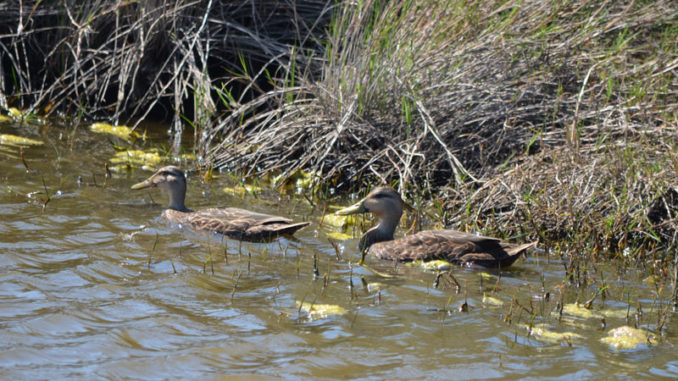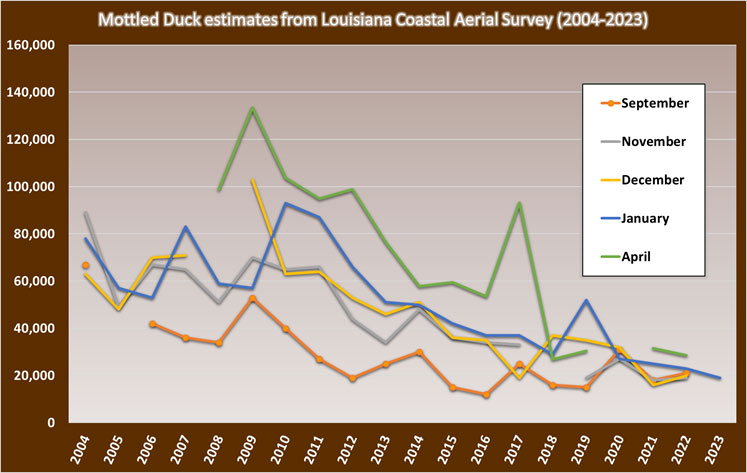
Louisiana sportsmen will need to pay more attention before pulling their triggers this waterfowl season, especially early in the season. Mottled ducks will be off limits for the first 15 days of the season with a limit of one per day after that in both zones. This regulation will remain in effect for the next three hunting seasons, providing that Louisiana gets a 60-day season each year.
“Five times a year, we count mottled ducks in Louisiana,” explained Jason Olszak, the Louisiana Department of Wildlife & Fisheries Waterfowl Program Manager in Lafayette. “All of those surveys show a significant decline in the population for quite a number of years. In January 2023, we estimated 19,000 birds, the lowest ever in a January survey. With the population trajectory of mottled ducks continuing to decline, we wanted to do something to reduce the annual harvest.”
The mottled duck populations dropped by as much as 70 percent during the past 50 years. In 2009, the state changed the daily limit from three to one, but the numbers continued to drop. Coastal aerial surveys estimated a record low of 16,000 in December 2022.

“I don’t believe that harvest is the major reason for the mottled duck population decline, Olszak opined. “It’s very likely habitat related. The loss of coastal marshes and the fragmentation of what’s left plays a factor in the mottled duck population. Invasive aquatic plants also create a problem when they fill in marsh potholes and ponds.
“Nevertheless, we feel it wise to reduce what is otherwise a constant harvest rate on a population that continued to decline even after the reduction in absolute harvest following the 2009 regulation change.
Mottled duck habitat
Louisiana loses significant marsh acreage every year and has for decades. Hurricanes like Katrina and Ida can rip giant chunks out of crucial mottled duck marsh habitat practically overnight. This transition of small marsh ponds to large sections of open water also degrades the suitability of the marsh to both mottled ducks and other wintering dabbling ducks.
Most mottled ducks live in coastal marshes with the highest concentrations in the marshes of southwestern Louisiana, followed by the Mississippi and Atchafalaya River deltas. Their core range also extends up through the prairie rice field country of Acadia, Jeff Davis and Evangeline parishes, but it’s not uncommon for someone to occasionally bag a mottled duck in north Louisiana.
Changes in agriculture also affect mottled duck habitat. Many landowners flood harvested or fallow rice less frequently, while others have switched from growing rice to planting sugar cane. Industrial and residential development is also slowly encroaching on mottled duck habitat.
“The biggest limiting factor for the mottled duck population is nesting and brood-rearing habitat,” Olszak advised. “Mottled ducks are well adapted to salt water, but prefer to nest or raise broods in fresh to intermediate marshes.”
To increase mottled duck habitat, the state began two initiatives. The Coastal Grassland Restoration Initiative Program (C-GRIP) works with landowners, such as those growing hay or raising cattle, to reclaim or improve their grasslands in a fashion and timeframe that benefits nesting ducks. Another program, the Louisiana Mottled Duck Project, focuses on helping landowners increase the quality and quantity of brood-rearing habitat so ducks can find sufficient water and cover during the summer to raise their broods.
Distinct populations
Non-migratory, mottled ducks exist in three geographically distinct populations. The West Gulf Coast population ranges from south Alabama to northeastern Mexico. Some birds winter as far south as Veracruz, Mexico. A population of transplanted birds from the western Gulf of Mexico lives in the coastal marshes of South Carolina and Georgia. A third subpopulation, sometimes called Florida ducks, exists in the Florida peninsula. Some occasionally stray into southern Georgia. The Florida population is genetically distinct from the West Gulf Coast population with little to no intermixing.
“Louisiana hunters bag about 98 percent of the mottled ducks harvested in the Mississippi Flyway,” Olszak said. “Mississippi and Alabama have very few mottled ducks. Some mottled ducks have been shot as far north as Kansas and Missouri, but that’s an oddity.”
Hen mallards, mottled ducks and black ducks all look very similar, especially during low-light conditions. They also all sound like mallards. Mallards show more blue in the wing speculum bordered by white at the top and bottom. Mottled ducks display more blueish-green in their wing speculum with just a faint touch of white at the bottom. Darker than mottled ducks with a more purplish wing speculum and no white, a few black ducks winter in Louisiana. Most stay on the East Coast.
“Black ducks are a very cold-tolerant species,” Olszak said. “We rarely observe black ducks in our Louisiana surveys until late December or January, which is well outside of the timeframe that we restrict mottled ducks. When we do encounter or harvest black ducks it is far more likely in the Mississippi Alluvial Valley of northeast Louisiana than the coastal marshes where mottled ducks occur. Even at that time, we don’t see very many black ducks in Louisiana. We do get some mallards in November, but mallards are also cold-hardy birds that tend to migrate south to coastal regions in late winter.
As always, positively identify any bird before pulling the trigger, especially early in the season. When in doubt, let it pass.


